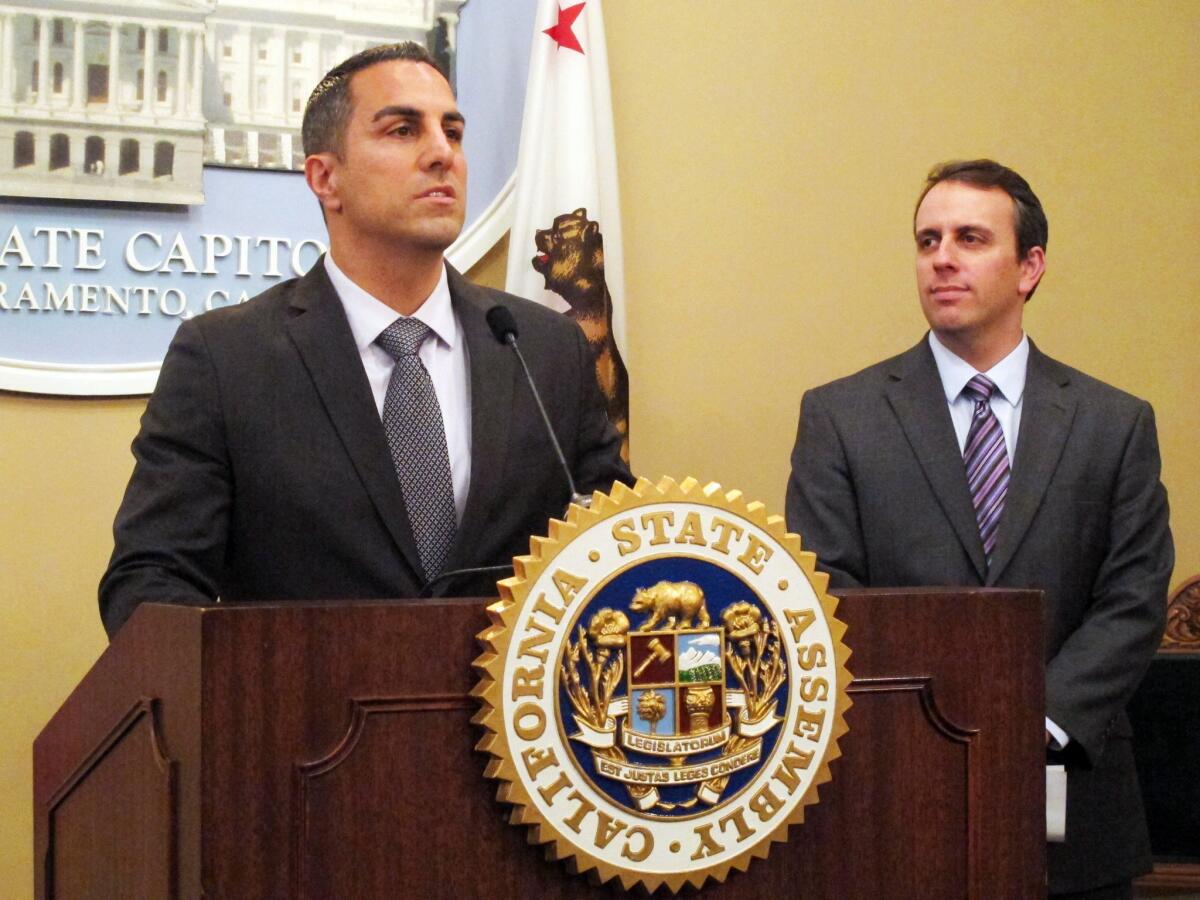Editorial: Not so fast on PUC ‘reform’

Assemblymembers Mike Gatto, D-Glendale (at podium), and Marc Levine, D-San Rafael, announce a proposal to overhaul the state’s Public Utilities Commission in Sacramento on Feb. 3.
What do trains, limousines, electric rates, gas pipelines, water delivery and Internet service have in common? Crazy as it sounds, the California Public Utilities Commission regulates all of them. And, many believe, not doing a very good job of it.
Discontent with the PUC and its commissioners has been brewing since a gas pipe ruptured in San Bruno in 2010, tearing up a neighborhood and killing eight people. The explosion exposed safety failures by Pacific Gas & Electric — and an unhealthy coziness between commissioners and the utilities they regulate. Legislators have been trying to upgrade the commission ever since, to no avail. Last year, Gov. Jerry Brown vetoed six bills that would have required the PUC to be more transparent in its dealings.
Then natural gas started leaking from an underground storage facility in Aliso Canyon above Porter Ranch, and again the PUC appeared to have dropped the ball. Assemblyman Mike Gatto (D-Glendale), chairman of the Assembly Utilities and Commerce Committee, has seized the moment with a plan to bypass the governor and go directly to voters to reform the PUC.
Actually, “reform” is a bit of understatement. Although the text of the bill is still being drafted, Gatto said earlier this month that he wants to break up the commission and have the Legislature redistribute its responsibilities among various state agencies. Taxis and Uber would go to the Department of Transportation, for example, and telecommunications to a second agency and power and water to a third.
There’s an attraction to such a straightforward separation of widely divergent regulatory assignments: no more time wasted dickering about who should conduct background checks on Uber drivers while pipelines go uninspected. But Gatto’s proposal goes too far and could undermine a century of consumer protections.
The PUC grew out of the California Railroad Commission, which was supposed to be a check on the Southern Pacific Railroad Company’s monopoly on rail and transportation, but instead sank deep into the railway’s pocket. California’s reform-minded governor Hiram Johnson could have disbanded the hated railroad commission, but he chose instead to strengthen its independence so that it wasn’t as beholden to politics as the Legislature. A few years later, Johnson expanded the scope of the commission to take in other monopolies of the day — water, power and telecommunications.
The PUC can still be a force for good for consumers. Just in recent months, [it] voted against utility proposals to jack up electric rates and gut incentives for solar rooftops.
In 1984, the Legislature improved the structure again by creating what is known now as the Office of Ratepayer Advocates, an independent arm of the commission that represents consumers when the PUC sets utility rates. Last year the office said it saved ratepayers $5.3 billion by pushing back against increases sought by utilities. If the PUC were dismantled, then consumers might lose this important advocate.
In fact, for all its failings, the PUC can still be a force for good for consumers. Just in recent months, the PUC has voted against utility proposals to jack up electric rates and gut incentives for solar rooftops.
The structural independence of the PUC has been both a strength and a weakness. Because it is a quasi-judicial board as opposed to a legislative body, commissioners are allowed to communicate privately with the utilities and lobbyists. This arrangement has fed suspicions that regulators are doing the utilities’ bidding. Indeed, former PUC President Michael Peevey is under criminal investigation for his back-channel communications with Southern California Edison while the PUC was determining how much ratepayers would have to cover of the costs of closing its San Onofre nuclear plant.
There’s no question that the PUC needs fundamental change, and no question the governor has been more of a hindrance than a help. The commission’s exemption from the state’s open meeting laws allows for a culture of collusion and ought to end. And the gifts and junkets that commissioners enjoy at the cost of the utilities must be curtailed as well. There may be other reforms needed to ensure the commission serves the public’s interest effectively. The causes of the PUC’s failings and how to fix them are what the Legislature ought to be exploring in depth before it moves to dump the PUC altogether.
It may well be that Gatto’s extreme proposal is a method of motivating the governor to support reform at the PUC. If that works, then great. But this is one bluff that ought not make it to the ballot. Let’s fix what’s broken with this independent agency, not throw it out.
Follow the Opinion section on Twitter @latimesopinion and Facebook
More to Read
A cure for the common opinion
Get thought-provoking perspectives with our weekly newsletter.
You may occasionally receive promotional content from the Los Angeles Times.










